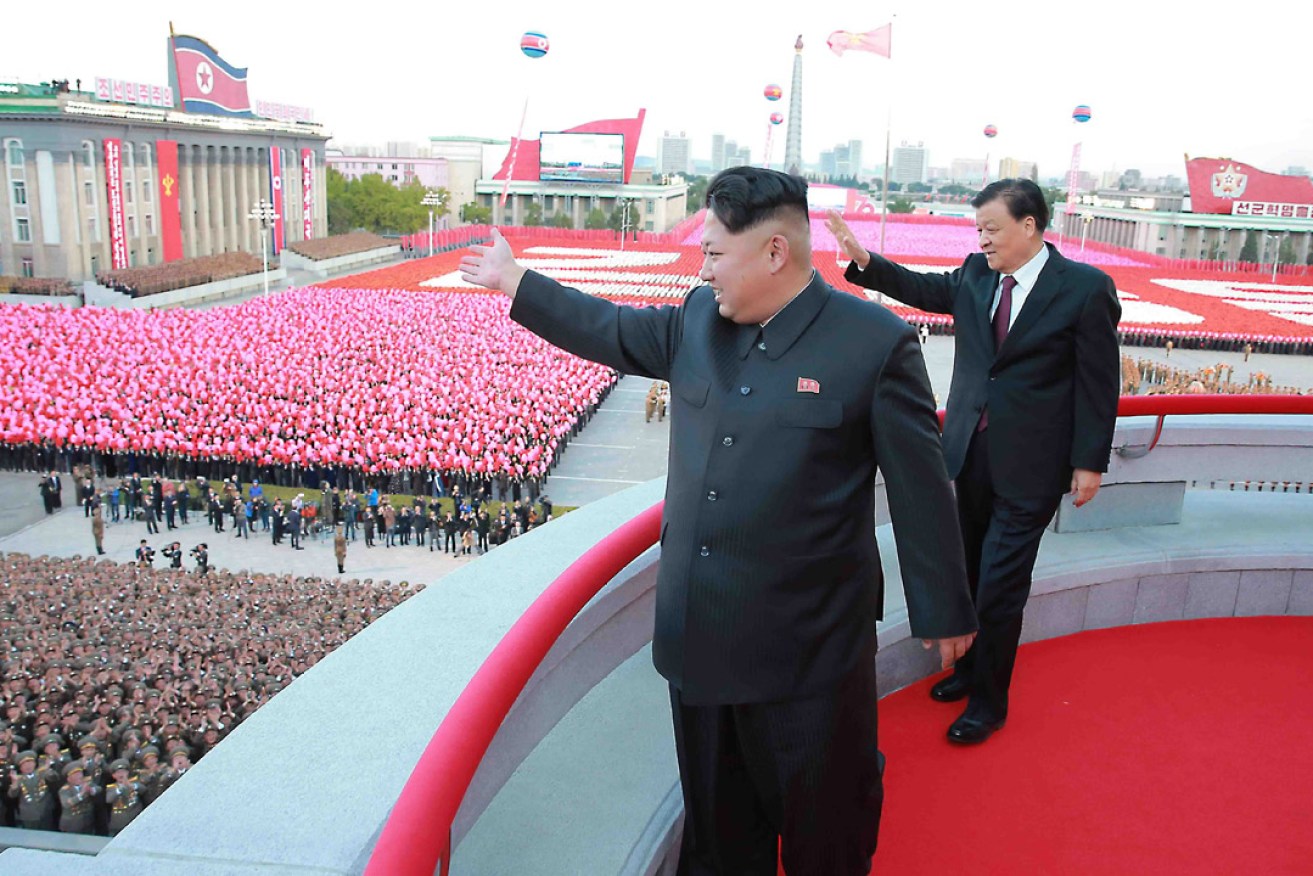The dangerous enigma that is Kim Jong-un
North Korean leader Kim Jong-un’s brinkmanship seems modelled more on Game of Thrones than the gritty hard graft of his predecessors’ politics, writes Adelaide University’s Felix Patrikeeff.

Kim Jong-un with Chinese Communist Party leader Liu Yunshan during a North Korean military parade in October. Photo: AAP
When Kim Jong-un became North Korea’s leader after his father Kim Jong-il’s sudden death in December 2011, commentators were split on how this inexperienced 28-year-old would manage that power.
After all, when his father took over from Kim Il-sung, the patriarch of this political dynasty, he was older (53) and more experienced, having been groomed for power since the early 1970s.
And yet Kim Il-sung disappeared from public view for some time. In consolidating his power-base, there were few public appearances, and it took him some three to four years to achieve supreme power.
Some expected that Kim Jong-un’s path would be more torturous still, and that he might fall under the sway of North Korean powerbrokers, notably those in the powerful military.
In the four years since he took the helm, however, he has shown a far more impetuous and self-confident approach to achieving supreme power than his father, sweeping aside experienced advisers and influential relatives with ruthless abandon.
He remains what Churchill said of the Soviet Union: ‘A riddle, wrapped in a mystery, inside an enigma’
Other commentators at the early stages pointed to his relative youth, his experiences in the Western world (he was partly schooled in Switzerland), and his penchant for modern popular culture – reportedly the music of Eric Clapton, and a confirmed passion for American basketball. Kim Jong-un, they suggested, might take North Korea through a process of economic reform and a speedier opening-up of the Stalinist “Hermit Kingdom”.
They, too, were left disappointed.
Jong-un’s approach has combined the Stalinist dictatorial public persona of his grandfather and the Machiavellian political nous of his father. To us all, he remains what Churchill said of the Soviet Union: “A riddle, wrapped in a mystery, inside an enigma”.
The crisis stemming from Wednesday’s H-bomb/A-bomb test in north-eastern DPRK (the Democratic People’s Republic of Korea) has shown how difficult it is to read “Dear Leader” (as he is known in North Korea), and more problematic still how to deal with him.
China, North Korea’s last remaining friend, has lost patience with him on a number of occasions, and its leadership is frustrated because he refuses to take advice from a country that is his state’s economic lifeline, injecting more than $US6 billion into its economy via direct and indirect aid. It is not a sum that North Korea can sneeze at, and yet, through its actions and recalcitrance, it is doing just that.
Economic sanctions, admonitions from the United Nations, and the palpable irritation of the United States all seem to be water off a duck’s back.
The most recent nuclear test shows that North Korea plans to act from a position of strength, and that it intends to use as its only consistent cards its formidable military (the fourth-largest standing army in the world) and its conventional/unconventional arsenals.
Such a bold gambit brings with it a potentially highly dangerous end-game.
The stakes are very high, and hopefully he has the political sense to know when he can no longer double-bluff.
Jong-un’s father was a consummate brinkman, drawing South Korea, the US and Japan to the edge, and then pulling back sharply. His grandfather was a master of the “general line”: he built the edifice that was totalitarian North Korea, and provided it with an ideological spine that holds this anachronistic communist state together in a way that Stalin himself would have envied.
Can Kim Jong-un combine these characteristics in a seamless fashion, and resist the ever-present temptation to take the political situation on the peninsula one step too far? Has he got the political maturity to accept that there are, ultimately, limits to his power? Can he adequately separate elements of political rhetoric intended for internal use in North Korea itself, from the complex practice of international politics in North-East Asia?
These questions lie at the heart of the journey he appears to be travelling in terms of refining nuclear payloads and delivery systems. The stakes are very high, and hopefully he has the political sense to know when he can no longer double-bluff.
In all of this, South Korea and Japan have the most difficult task of reading Kim Jong-un’s intent, and this is significant as they are the likely targets of any genuine strike by the North. Both are seen as client states of the US, and therefore its willing political servants.
While Jong-un’s missiles are a long way away from being able to strike the US mainland, directing these at closer regional targets may be achievable in the medium term.
As a pampered “princeling”, Kim Jong-un enjoyed a rarefied adolescence and early adulthood, and he did not cut his political teeth on the struggles to build a state, as his grandfather did, nor the internecine scraps engaged in by his father in maintaining control of it. Indeed, Jong-un’s machinations appear to be modelled more on The Game of Thrones, rather than the gritty hard graft of his predecessors’ politics.
His grandfather reputedly said that if North Korea were to be destroyed, it would, in the process, destroy the world, as there could be no world without North Korea. Kim Il-sung’s words might have been political flourish of the highest order, but Jong-un himself seems to be uncomfortably close to accepting them at face value.
Felix Patrikeeff is an Associate Professor in International Politics and Head of Department, Politics and International Studies, at Adelaide University. He has worked and published extensively in the area of North-East Asian history and politics, and is President of the Australian Institute of International Affairs (SA).




